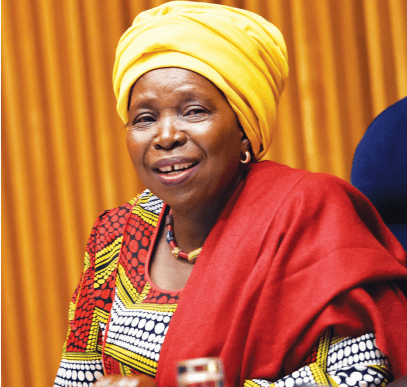Charles Molele
The sale of alcohol, inter-provincial travel and large gatherings remain strictly prohibited in South Africa until it is safe to do so, according to Cooperative Governance and Traditional Affairs Minister, Dr Nkosazana Dlamini-Zuma.
Addressing a media conference on the Level 4 lockdown restrictions, Dlamini-Zuma said these measures were not meant to punish anyone but to curb the spread of the novel coronavirus.
She said the COVID-19 crisis presented an unprecedented challenge to government, unmatched since the Spanish Flu and the Great Depression.
The latter decimated over 300 000 South Africa’s population.
Dlamini-Zuma reiterated her call that coronavirus was a collective challenge and required shared sacrifices in order to achieve the impossible goal of going to Level 1.
She said if infections rise in the next coming weeks, the government will not hesitate to revert to back to a hard Level 5 lockdown.
“It’s not health measures that will destroy the economy. It is the virus that will destroy the economy,” said Dlamini-Zuma.
She said as of May 1, a national curfew from 8pm to 5am will be in place and will be applicable to everyone except essential workers traveling to and from work.
She said businesses and various industries are encouraged to adopt a work-from-home strategy where possible, and all staff who can work remotely must be allowed to do so.
“Workers above the age of 60, as well as workers with comorbidities, should be offered a work-from-home option or remain on leave after engagement with employers and the UIF,” said Dlamini-Zuma.
“Workplace protocols to be in place should include disease surveillance and prevention of the spread of infection, disabling contact biometric systems or making them COVID-proof.”
She said individual businesses or workplaces must have COVID-19 risk assessments and plans in place, and must conduct worker education on COVID-19 and protection measures.
Monitoring systems must also be in place to ensure compliance with safety protocols and identify infections among employees, said Dlamini-Zuma
She said mass testing should also be carried out for workplaces with over 500 workers.
“The risk-adjusted approach was developed through collaboration between the economic cluster departments and the Department of Health. We have taken into account comments made by business organisations, political parties, trade unions and commentators,” said Dlamini-Zuma.
“This proposal takes into account the advice of the Ministerial Advisory Committee that the high-point of the virus spread is likely to be in September, which requires a proposal that covers the next 6-8 months.”
President Cyril Ramaphosa this week announced a five-phased relaxation of regulations that will kick-start from next week Friday.
With over 4,200 infections and almost 80 deaths, Dlamini-Zuma said wearing a masks will is now compulsory as they are useful in the fight against COVID-19.
“Wear a mask all the time. Sanitize all the time,” said
Dlamini-Zuma.
She said certain cultural practices would also have to be discarded in order to fight COVID-19.
“Touching at funerals and other social gatherings is now a thing of the past. There must be culture change in order to fight COVID-19,” said Dlamini-Zuma.
“We need to do away with certain cultural practices that contribute to the spread of the disease; for example, if you are closing a grave and exchanging spades and shovels with everyone, all those who have touched the spade or shovel will contract the virus.’



